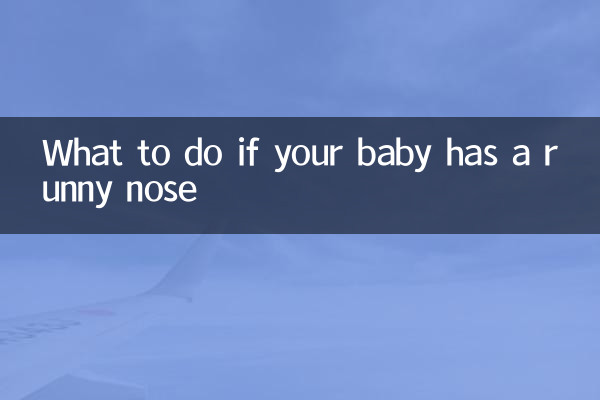What to do if your baby has a runny nose
Runny nose in babies is a common problem for many parents, especially when the seasons change or the temperature changes significantly. This article will combine the hot topics and hot content on the Internet in the past 10 days to provide parents with scientific and practical solutions.
1. Common causes of runny nose in babies

There are many reasons for babies' runny noses. The following are the most discussed reasons on the Internet in the past 10 days:
| Reason | Proportion | Main symptoms |
|---|---|---|
| cold | 45% | Runny nose, cough, mild fever |
| Allergy | 30% | Clear nose, sneezing, red eyes |
| Nasal irritation | 15% | Small amount of nasal discharge and no other symptoms |
| Others | 10% | Need to be judged based on specific symptoms |
2. How to judge the severity of a baby’s runny nose
Based on popular discussions in the past 10 days, parents can quickly judge the severity of their baby's runny nose through the following table:
| Symptoms | Mild | Moderate | Severe |
|---|---|---|---|
| nasal mucus color | clear | light yellow | Dark yellow or green |
| Amount of nasal discharge | small amount | medium | A lot |
| accompanying symptoms | None or slight | Cough, mild fever | High fever, difficulty breathing |
| duration | 1-3 days | 3-7 days | more than 7 days |
3. Home care methods for babies with runny nose
The following are the most popular home care methods for babies with runny nose in the past 10 days:
1.Keep your nasal passages clean: Using saline nose drops or a nasal aspirator to help clear your nose is the most recommended method.
2.increase air humidity: Use a humidifier to keep the indoor humidity between 40% and 60% to help relieve nasal dryness.
3.Raise your head appropriately: Slightly raising the baby's head while sleeping can reduce the discomfort caused by nasal discharge.
4.drink more water: For babies who have started to add complementary foods, appropriately increasing water intake can help dilute nasal mucus.
4. When Do You Need Medical Treatment?
According to the advice of medical experts in the past 10 days, you should seek medical treatment immediately if you encounter the following situations:
| Symptoms | Possible reasons | Urgency |
|---|---|---|
| Bloody nose | Nasal damage or severe infection | seek medical attention immediately |
| persistent high fever | bacterial infection | Seek medical attention within 24 hours |
| difficulty breathing | airway obstruction | seek medical attention immediately |
| refuse to eat | severe discomfort | Seek medical attention within 24 hours |
5. Measures to prevent runny nose in babies
1.Keep the house clean: Clean the room regularly to reduce dust and allergens.
2.Avoid contact with people with colds: Minimize your baby’s contact with cold patients during flu season.
3.dress appropriately: Add or remove clothing in time according to temperature changes to avoid overheating or coldness.
4.breastfeeding: Breast milk contains antibodies, which can help your baby strengthen their immunity.
6. Analysis of common misunderstandings
Based on experts debunking rumors in the past 10 days, here are the common misunderstandings about babies with runny noses:
| Misunderstanding | facts |
|---|---|
| Green nasal discharge is a bacterial infection | Not necessarily, green nasal discharge may also appear in the later stages of a viral cold |
| If you have a runny nose, take antibiotics | In most cases, antibiotics are not needed. Overuse of antibiotics can be harmful. |
| The more nasal discharge, the more serious the condition will be. | The amount of nasal discharge is not directly related to the severity of the disease |
| Adult medications are freely available | Absolutely prohibited, infants must follow doctor’s advice when using medication |
7. Summary of Expert Suggestions
Based on expert opinions from the past 10 days, the following are the recommendations for dealing with a baby’s runny nose:
1. First observe the baby's overall condition. If the baby is in good spirits and eating normally, you can try home care first.
2. Do not rely too much on medicines, especially for babies under 6 months old, who need to be extra cautious when using medicines.
3. Prevention is better than cure. Pay attention to strengthening your baby’s immunity.
4. If you are unsure about anything, please consult your pediatrician promptly.
Through the above structured data and detailed analysis, we hope to help parents scientifically deal with the problem of runny noses in babies, so that babies can grow up healthier and happier.

check the details

check the details